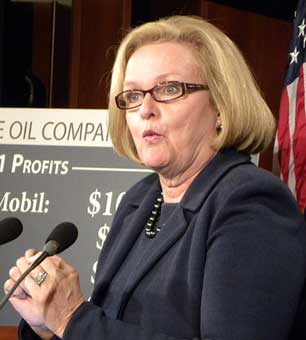Honest, paywall-free news is rare. Please support our boldly independent journalism with a donation of any size.
Washington – An elite group of federal employees is set to receive cash bonuses despite this year’s automatic budget cuts, according to a report that a Senate subcommittee issued Friday.
The report revealed that members of the government’s highly paid Senior Executive Service – who make up less than 1 percent of the federal workforce – had received more than $340 million in bonuses from 2008 through 2011. The bonuses came on top of annual salaries that ranged from $119,000 to $179,000.
In a process known as sequestration, $85 billion in across-the-board federal spending cuts took effect March 1, forcing the government to slash services and furlough workers. A month later, the Obama administration froze bonuses for the vast majority of federal workers.
But by law, agencies still must pay bonuses to Senior Executive Service employees who meet certain performance criteria, the report said.
Missouri Sen. Claire McCaskill, a Democrat, introduced a bill Friday that would eliminate bonuses for members of the Senior Executive Service during sequestration. McCaskill leads the Senate Subcommittee on Financial and Contracting Oversight, which produced the report.
“The idea that some of the highest-paid federal government employees could be getting bonuses while others are being furloughed is outrageous,” McCaskill said in a statement. “This legislation will ensure that doesn’t happen.”
Created by the Civil Service Reform Act of 1978, the Senior Executive Service is made up of leaders who serve in key positions just below top presidential appointees, according to the U.S. Office of Personnel Management website. They oversee the day-to-day activities of about 75 federal agencies.
Friday’s report found that the federal government had handed out more than 6,300 cash awards to members of the Senior Executive Service in 2011, for a total of $78 million. Most Senior Executive Service employees – 81 percent – received bonuses that year, the report said.
The agencies that spent the most money on Senior Executive Service bonuses were the Nuclear Regulatory Commission, which paid more than $16,000 per employee; the National Science Foundation, which paid more than $14,000 per employee; the Department of the Navy, which paid $13,000 per employee; the Department of Health and Human Services, which also paid $13,000 per employee; and the Department of Commerce, which paid more than $12,000 per employee.
The report singled out the General Services Administration as doling out the most performance awards on average. The agency spent $1.1 million on bonuses in 2011, and each Senior Executive Service employee received an average of 1.6 bonuses, the report said.
The GSA is responsible for acquiring real estate, technology services and other big-ticket items for the federal government.
A GSA spokesman said in an email that the agency had cut executive bonuses by 85 percent last year and hasn’t paid any such bonuses this year. The agency also cut its Awards Stores program, in which employees could choose prizes such as iPods and digital cameras.
New leadership at the GSA is working to overhaul the entire performance awards system, said the agency’s spokesman, Dan Cruz. “Under this administration, GSA bonuses are coming down to their lowest levels in five years,” Cruz said.
A separate report published Thursday by auditors at the GSA’s Office of Inspector General criticized the agency, saying it violated many of the legal requirements for awarding bonuses.
The GSA is the same agency that came under scrutiny in Congress last year for a lavish conference in Las Vegas in 2010 and other such spending of taxpayer dollars, including exorbitant bonuses.
Media that fights fascism
Truthout is funded almost entirely by readers — that’s why we can speak truth to power and cut against the mainstream narrative. But independent journalists at Truthout face mounting political repression under Trump.
We rely on your support to survive McCarthyist censorship. Please make a tax-deductible one-time or monthly donation.
